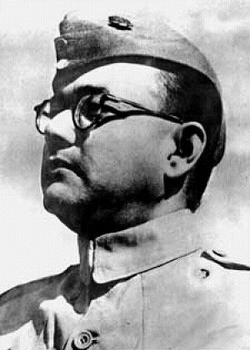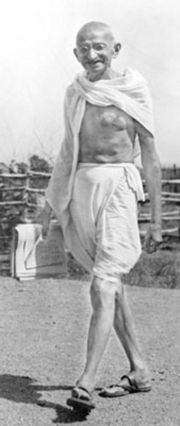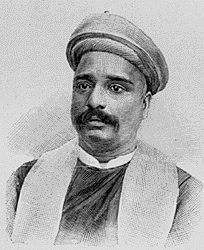| |
Subhash Chandra Bose
 |
- I cannot write about Vivekananda without going into raptures. Reckless in his sacrifice, unceasing in his activity, boundless in his love, profound and versatile in his wisdom, exuberant in his emotions... I can go on for hours and yet fail to do the slightest justice to that great man. He was so great, so profound, so complex. He was a Yogi of the highest spiritual level, in direct communion with the Truth, who consecrated his whole life to the moral and spiritual uplift of humanity.
- “Swamiji harmonized the East and the West, religion and science, past and present. And that is why he is great. Our countrymen have gained unprecedented self-respect, self-reliance and self-assertion from his teachings.”
- "He was so great, so profound, so complex. A Yogi of the highest spiritual level in direct communion with the truth who had for the time being consecrated his whole life to the moral and spiritual uplift of his nation and of humanity, that is how I would describe him. If he had been alive, I would have been at his feet
–Subhash Chandra Bose (Jan 23, 1897 - Aug 18, 1945?)
Mahatma Gandhi
I have gone through his works very thoroughly, and after having gone through them, the love that I had for my country became a thousand-fold.
–Mahatma Gandhi (Oct 2, 1869 - Jan 30, 1948)
Jawaharlal Nehru
 |
- Where can you find a man like him? Study what he wrote, and learn from his teachings, for if you do, you will gain immense strength. Take advantage of the fountain of wisdom, of Spirit, and of fire that flowed through Vivekananda!
- “Rooted in the past, full of pride in India’s prestige, Vivekananda was yet modern in his approach to life’s problems, and was a kind of bridge between the past of India and her present … he came as a tonic to the depressed and demoralized Hindu mind and gave it self-reliance and some roots in the past.”
- "Men like Sri Ramakrishna, men like Swami Vivekananda and men like Mahatma Gandhi are great unifying forces, great constructive geniuses of the world not only in regard to the particular teachings that they taught, but their approach to the world and their conscious and unconscious influence on it is vitally important to us."
- About the same period as Swami Dayananda, a different type of person lived in Bengal and his life influenced many
of the new English-educated classes . He was Shri
Ramakrishna Paramahamsa, a simple man, no scholar but a man
of faith, and not interested in social reform as such . He
was in a direct line with Chaitanya and other Indian saints.
Essentially religious and yet broad-minded, in his search
for self-realization he went to Moslem and Christian
mystics and lived with them for years, following their strict
routines . He settled down at Dakshineshwar near Calcutta,
and his extraordinary personality and character gradually
attracted attention . People who went to visit him, and
some who were even inclined to scoff at this simple man of
faith, were powerfully influenced, and many who had been
completely westernized felt that here was something they
had missed . Stressing the essentials of religious faith, he
linked up the various aspects of the Hindu religion and
philosophy and seemed to represent all of them in his own
person . Indeed he brought within his fold other religions
also . Opposed to all sectarianism, he emphasized that all
roads lead to truth . He was like some of the saints we read
about in the past records of Asia and Europe; difficult to
understand in the context of modern life, and yet fitting
into India's many-colored pattern and accepted and revered
by man of her people as a man with a touch of the divine
fire about him . His personality impressed itself on all who
saw him, and many who never saw him have been
influenced by the story of his life . Among these latter is Romain
Rolland, who has written a story of his life and that of his
chief disciple, Swami Vivekananda.
Vivekananda, together with his brother disciples,
founded the nonsectarian Ramakrishna Mission of service.
Rooted in the past and full of pride in India's heritage,
Vivekananda was yet modern in his approach to life's
problems and was a kind of bridge between the past of India
and her present . He was a powerful orator in Bengali and
English and a graceful writer of Bengali prose and poetry.
He was a fine figure of a man, imposing, full of poise and
dignity, sure of himself and his mission, and at the same
time full of a dynamic and fiery energy and a passion to
push India forward . He came as a tonic to the depressed
and demoralized Hindu mind and gave it self-reliance and
some roots in the past . He attended the Parliament of
Religions in Chicago in 1893, spent over a year in the U.S.A.,
traveled across Europe going as far as Athens and
Constantinople, and visited Egypt, China, and Japan . Wherever
he went, he created a minor sensation not only by his
presence but by what he said and bow he said it . Having seen
this Hindu sanyasin once, it was difficult to forget him or
his message . In America he was called the ``cyclonic
Hindu.'' He was himself greatly influenced by his travels
in Western countries; he admired British perseverance, and
the vitality and spirit of equality of the American people.
``America is the best field in the world to carry on any idea,''
he wrote to a friend in India . But he was not impressed
by the manifestations of religion in the West, and his faith
in the Indian philosophical and spiritual background
became firmer . India, in spite of her degradation, still
represented to him the Light.
He preached the monism of the Advaita philosophy of
the Vedanta, and was convinced that only this could be the
future religion of thinking humanity . For the Vedanta was
not only spiritual but rational and in hannony with
scientific investigations of external nature . ``This universe has
not been created by any extra-cosmic God, nor is it the
work of any outside genius . It is self-creating,
self-dissolving, self-manifesting, One Infinite Existence, the Brahma.''
The Vedanta ideal was of the solidarity of man and his
inborn divine nature; to see God in man is the real
Godvision; man is the greatest of all beings . But the abstract
Vedanta must become living-poetic-in everyday life; out
of hopelessly intricate mythology must come concrete
moral forms; and out of bewildering Yogi-ism must come
the most scientific and practical psychology.'' India had
fallen because she had narrowed herself, gone into her shell
and lost touch with other nations, and thus sunk into a
state of ``mummified'' and ``crystalled'' civilization . Caste,
which was necessary and desirable in its early forms, and
meant to develop individuality and freedom, had become
a monstrous degradation, the opposite of what it was meant
to be, and had crushed the masses . Caste was a form of
social organization which was and should be kept separate
from religion . Social organizations should change with the
changing times . Passionately Vivekananda condemned the
meaningless metaphysical discussions and arguments about
ceremonials, and especially the touch-me-notism of the
upper castes . ``Our religion is in the kitchen . Our God is
the cooking-pot, and our religion is: `don't touch me, I am
holy.'''
He kept away from politics and disapproved of the
politicians of his day . But again and again he laid stress on
the necessity for liberty and equality and the raising of the
masses . ``Liberty of thought and action is the only
condition of life, of growth and well-being . Where it does not
exist, the man, the race, the nation must go.'' ``The only
hope of India is from the masses . The upper classes are
physically and morally dead.'' He wanted to combine
Western progress with India's spiritual background: ``Make
a European society with India's religion . . . . Become an
Occidental of occidentals in your spirit of equality,
freedom, work and energy, and at the same time a Hindu to
the very backbone in religious culture and instincts.''
Progressively Vivekananda grew more international in outlook:
``Even in Politics and Sociology, problems that were only
natianal twenty years ago can no longer be solved on
national grounds only . They are assuming huge proportions,
gigantic shapes . They can only be solved when looked at in
the broader light of international grounds . International
organizations, international combinations, international
laws are the cry of the day . That shows solidarity . In
science, every day they are coming to a similar broad view
of matter.'' And again: ``There cannot be any progress
without the whole world following in the wake, and it is
becoming every day clearer that the solution of any problem
can never be attained on racial, or national, or narrow
grounds . Every idea has to become broad till it covers the
whole of this world, every aspiration must go on increasing
till it has engulfed the whole of humanity, nay the whole
of life, within its scope.'' All this fitted in with
Vivekananda's view of the Vedanta philosophy, and he preached
this from end to end of India . ``I am thoroughly convinced
that no individual or nation can live by holding itself apart
from the community of others, and wherever such an
attempt has been made under false ideas of greatness, policy
or holiness-the result has always been disastrous to the
secluding one . . . . The fact of our isolation from all the
other nations of the world is the cause of our degeneration
and its only remedy is getting back into the current of the
rest of the world . Motion is the sign of life.''
He once wrote: ``I am a socialist not because I think it is
a perfect system, but half a loaf is better than no bread.
The other systems have been tried and found wanting . Let
this one be tried, if for nothing else, for the novelty of the
thing.''
Vivekananda spoke of many things, but the one constant
refrain of his speech and writing was abhaya - be fearless, be
strong . For him man was no miserable sinner but a part of
divinity; why should he be afraid of anything? ``If there
is a sin in the world it is weakness; avoid all weakness,
weakness is sin, weakness is death.'' That had been the
great lesson of the Upanishads . Fear breeds evil and
weeping and wailing . There had been enough of that, enough of
softness . What our country now wants are muscles of iron
and nerves of steel, gigantic wills which nothing can resist,
whith can penetrate into the mysteries and the secrets of
the universe, and will accomplish their purpose in any
fashion, even if it meant going down to the bottom of the ocean
and meeting death face to face.'' He condemned occultism,
and mysticism . . . these creepy things; there may be great
truths in them, but they have nearly destroyed us . . . .
And here is the test of truth - anything that makes you
weak physically, intellectually and spiritually, reject as
poison, there is no life in it, it cannot be true . Truth is
strengthening . Truth is purity, truth is all-knowledge . . . .
These mysticisms, in spite of some grains of truth in them,
are generally weakening . . . . Go back to your Upanishads,
the shining, the strengthening, the bright philosophy, and
part from all these mysterious things, all these weakening
things . Take up this philosophy; the greatest truths are the
simplest things in the world, simple as your own existence.''
And beware of superstition . ``I would rather see everyone
of you rank atheists than superstitious fools, for the atheist
is alive, and you can make something of him . But if
superstition enters, the brain is gone, the brain is
softening, degradation has seized upon the life . . . .
Mysterymongering and superstition are always
signs of weakness.''Most of these extracts have been
taken from Lectures from
Colombo to Almora by Swami Vivekananda (1933) and Letters
of Swami Vivekananda (1942) , both published by the Advaita
Ashrama, Mayavati, Almora, Himalayas . In the Letters, P-390,
there is a remarkable letter written by Vivekananda to a Moslem
friend . In the course of this he says:
``Whether we call it Vedantism or any ism, the truth is that
Advaitism is the last word of religion and thought and the only
position from which one can look upon all religions and sects
with love . We believe it is the religion of the future enlightened
humanity . The Hindus may get the credit of arriving at it earlier
than other races, they being an older race than either the Hebrew
or the Arab; yet practical Advaitism, which looks upon and
behaves to all mankind as one's own soul, is yet to be developed
among the Hindus universally.
``On the other hand our experience is that if ever the followers
of any religion approach to this equality in an appreciable degree
in the plane of practical work-a-day life-it may be quite
unconscious generally of the deeper meaning and the underlying
principle of such conduct, which the Hindus as a rule so clearly
perceive - it is those of Islam and Islam alone . . . .
``For our own motherland a junction of the two great systems,
Hinduism and Islam.-Vedanta brain and Islam body-is the
only hope.
``I see in my mind's eye the future perfect India rising out of
this chaos and strife, glorious and invincible, with Vedanta brain
and Islam body.'' This letter is dated Almora, 10th June, 1898-
Footnote
So Vivekananda thundered from Cape Comorin on the
southern tip of India to the Himalayas, and he wore
himself out in the process, dying in 1902 when he was
thirtynine years of age.
(From the 'Discovery of India')
–Jawaharlal Nehru, the first Prime Minister of India
(Nov 14, 1889 - May 27, 1964)
Bal Gangadhar Tilak
It is an undisputed fact that it was Swami Vivekananda who first held aloft the banner of Hinduism as a challenge against the material science of the West. It was Swami Vivekananda who first took on his shoulders this stupendous task of establishing the glory of Hinduism in different countries across the borders. And he, with his erudition, oratorical power, enthusiasm, and inner force, laid that work upon a solid foundation. Twelve centuries ago Shankara was the only great personality who not only spoke of the purity of our religion... but also brought all this into action. Swami Vivekananda is a person of that stature.
–Bal Gangadhar Tilak (Jul 23, 1856 - Aug 1, 1920)
(Tilak met Vivekananda several times)
|
|



